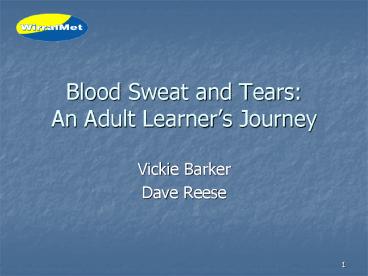Blood Sweat and Tears: An Adult Learner - PowerPoint PPT Presentation
1 / 16
Title:
Blood Sweat and Tears: An Adult Learner
Description:
To introduce mature students to Psychology through a Multidisciplinary and ... B. (2004) Retention and Success in H.E., Maidenhead: SRHE & Open University ... – PowerPoint PPT presentation
Number of Views:150
Avg rating:3.0/5.0
Title: Blood Sweat and Tears: An Adult Learner
1
Blood Sweat and TearsAn Adult Learners Journey
- Vickie Barker
- Dave Reese
2
History of the 22 Psychology
- Course was initiated in 1994
- The purpose was to provide an entry route for
mature students lacking standard qualifications - The Aims of the course
- To introduce mature students to Psychology
through a Multidisciplinary and integrated
approach - To provide successful foundation into the second
year of the degree scheme at the University of
Liverpool for the BSc. (hons) psychology
3
Timeline
Decision making
Enquiry
UCAS form
Confirmation
Successful completion Year 0
Successful completion Year 1
Induction/enrolment
Successful completion Year 2 and 3
Graduation
4
Ethos
- Retention begins from first point of contact.
- Recognition that for each student different
stages of the process may be painful or at least
extremely challenging. - Nutt (2005) highlights the impact of critical
times on non traditional students e.g. - Starting placements, exam times but also includes
times of significant change
5
Enquiry-UCAS
- Yorke (1999) many reasons for leaving can be
addressed through the clarity and accuracy of
information provided - Telephone /email enquiry
- Learner services
- 22 tutor
- Sent Frequently Asked Questions leaflet
- Contains open and transparent guidance on entry
criteria - Advice on completing personal statement
- Contact details for Senior Welfare Advisor for
help with financial component.
6
UCAS form
- On receipt the aim is to clearly ensure there is
no mismatch between the student and the course on
offer. (Cook 2005) - Email sent informing applicant that it is being
processed. - If applicant matches entry criteria
- Unconditional offer made-University Informed then
UCAS - Email sent from WMC outlining next steps
- Interview opportunity
- If personal statement lacks clarity of
subject/course/career choice - Interview offer contains guidance on preparation
7
Interview Guidance
- The interview provides the opportunity to
explore - The facilities available at Wirral Metropolitan
College - The reasons and motivation behind your decision
to apply for the BSc. Psychology 2 Plus 2
Programme (C801) course - What you feel may be the most difficult or
demanding aspects about undertaking a 4-year
degree? - How you will deal with these to enable you to
successfully achieve your degree in Psychology - Also contains web links to School of Psychology
Web site, Research Groups - BPS careers guidance page.
8
Other points
- Interview also offers opportunity to
- Evaluate match between students perception of
the course and reality (Cook 2005) - Course content (link to research groups web site)
- Time demands
- Assessment processes
- Financial implications
- Career goals (link to BPS website)
- Explore alternative courses that may match
students requirements more closely - Typically Access to HE courses.
- PT provision
- Counselling related courses.
9
Confirmation
- Letter Invite to open morning
- To unconditional unconfirmed and confirmed
- Opportunity to
- See facilities
- Meet Staff
- Meet Future students
- Ask financial questions (Senior Welfare Advisor)
- Meet current and previous students
- Reminded of the facility to email any questions
10
Induction and starting out
- Recommendations from Nutts (2005) research
highlights the importance of academic and support
staff working collaboratively to identify and
tackle critical issues. - Carefully planned induction process embedded in
curriculum delivery. - Joint institutional induction to emphasis dual
student identity
11
Year 0
- Students receive timely feedback on their
progress both qualitative and quantitative - Rowntree Report (2005) Nutt (2005) clear
feedback from the start of a course can reduce
drop-out. - Small group size allows for differentiated
support (Chickering and Gamson, 1987) - Study skills are integrated into the curriculum
via the Complementary Studies module (Quinn 2005) - Lead tutors have joint pastoral and academic
roles to ensure students feel like they belong
(Tinto, 1987)
12
Year 1 Transition
- Nutt (2005) non-traditional students are
vulnerable at critical transition times - Year 1 marks the start of the transition to UoL
- Tutor presence and support academic practical
- The aim is to produce reflective, informed and
independent learners
13
Years 2 3
- By the start of Year 2 they should be fully
integrated into the School of Psychology
confident users of IT, library, support
facilities and be familiar with School staff. - WMC staff share key information with School of
Psychology to flag potential issues. - Year 2 students provide peer support for Year 1
students (Draper 2008)
14
Success
Lone parent of 4 children initially trained and
worked as hairdresser Left in term 1 due to lack
of confidence Returned and completed 4 years
graduating with a first
- Student studied for 7 years despite serious
health problems gained a 3rd
Student gave birth to first child in Easter of
year 1. Completed exam period in year 1 2 years
later graduated with a First
Student completed 22 Moved to Birmingham
University completed PhD Now has 6 published
articles on immunological impact of stress
15
Finally
- Thank you for listening
- Any Questions
- vickie.barker_at_wmc.ac.uk
- david.reese_at_wmc.ac.uk
16
References
- Cook, A., B.S. Rushton, S.M. McCormick and D.W.
Southall, (2005). Guidelines for the Management
of Student Transition. University of Ulster.
Coleraine. - Nutt, D. (2005) Retaining Non-Traditional
Students in Higher Education, University of
Teeside Centre for Learning and Quality
Enhancement. - Quinn, J., Thomas, L., Slack, K. Casey, L.
Thexton, W. and Nobel, J. (2005) From Life Crisis
to Lifelong Learning Rethinking Working Class
Dropout from Higher Education Joseph Rowntree
Foundation, York Publishing. - Yorke, M. and Longden, B. (2004) Retention and
Success in H.E., Maidenhead SRHE Open
University































